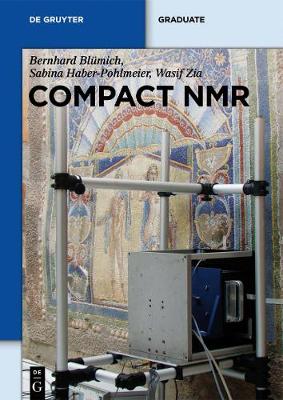De Gruyter Textbook
2 total works
The goal of this book is to provide an introduction to the practical use of mobile NMR at a level as basic as the operation of a smart phone. Each description follows the same didactic pattern: introduction, basic theory, pulse sequences and parameters, beginners-level measurements, advanced-level measurements, and data processing.
Nuclear Magnetic Resonance (NMR) spectroscopy is the most popular method for chemists to analyze molecular structures while Magnetic Resonance Imaging (MRI) is a non-invasive diagnostic tool for medical doctors that provides high-contrast images of biological tissue depicting the brain function and the beating heart.
In both applications large super-conducting magnets are employed which magnetize atomic nuclei of an object positioned inside the magnet. Their circulating motion is interrogated by radio-frequency waves. Depending on the operating mode, the frequency spectrum provides the chemist with molecular information, the medical doctor with anatomic images, while the materials scientist is interested in NMR relaxation parameters, which scale with material properties and determine the contrast in magnetic resonance images.
Recent advances in magnet technology led to a variety of small permanent magnets, by which NMR spectra, images, and relaxation parameters can be measured with mobile and low-cost instruments.
Nuclear Magnetic Resonance (NMR) spectroscopy is the most popular method for chemists to analyze molecular structures while Magnetic Resonance Imaging (MRI) is a non-invasive diagnostic tool for medical doctors that provides high-contrast images of biological tissue depicting the brain function and the beating heart.
In both applications large super-conducting magnets are employed which magnetize atomic nuclei of an object positioned inside the magnet. Their circulating motion is interrogated by radio-frequency waves. Depending on the operating mode, the frequency spectrum provides the chemist with molecular information, the medical doctor with anatomic images, while the materials scientist is interested in NMR relaxation parameters, which scale with material properties and determine the contrast in magnetic resonance images.
Recent advances in magnet technology led to a variety of small permanent magnets, by which NMR spectra, images, and relaxation parameters can be measured with mobile and low-cost instruments.
Polymer Analysis provides an overview of polymer sciences with a strong focus on the analytical methods to determine molecular mass, structure, morphology, thermal and mechanical properties. The theoretical background of each analytical method is introduced. The practical aspects are clearly set out and linked to the desirable properties of the material such as strength, impermeability, thermal stability, and optical properties.

